From the anthroposophy teachings of Rudolf Steiner, "Pneumatosophy" (wisdom of the spirit) can be seen as part of his teachings on spiritual science and approaches the human spirit in terms of truth and error and the meaning and the effects of imagination, intuition, and inspiration. In some cases it will be difficult to understand the context between the subject matter and what is here termed pneumatosophy. Pneuma (Greek) literally "breath" or "wind". In the Bible is usually translated as "spirit". The suffix sophy stands for knowledge.

Filioque is a Latin term added to the original Niceno-Constantinopolitan Creed, and which has been the subject of great controversy between Eastern and Western Christianity. It is a term that refers to the Son, Jesus Christ, with the Father, as the one shared origin of the Holy Spirit. It is not in the original text of the Creed, attributed to the First Council of Constantinople (381), which says that the Holy Spirit proceeds "from the Father", without additions of any kind, such as "and the Son" or "alone".

Pentecostalism or classical Pentecostalism is a Protestant Charismatic Christian movement that emphasizes direct personal experience of God through baptism with the Holy Spirit. The term Pentecostal is derived from Pentecost, an event that commemorates the descent of the Holy Spirit upon the Apostles and other followers of Jesus Christ while they were in Jerusalem celebrating the Feast of Weeks, as described in the Acts of the Apostles.
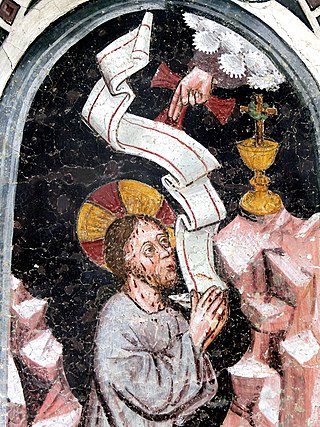
A spiritual gift or charism is an extraordinary power given by the Holy Spirit. These are believed by followers to be supernatural graces which individual Christians need to fulfill the mission of the Church. In the narrowest sense, it is a theological term for the extraordinary graces given to individual Christians for the good of others and is distinguished from the graces given for personal sanctification, such as the Seven Gifts of the Holy Spirit and the fruit of the Holy Spirit.
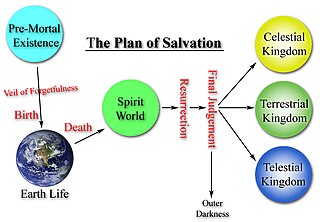
In Latter Day Saints theology, the term spirit world refers to the realm where the spirits of the dead await the resurrection. In LDS thought, this spirit world is divided into at least two conditions: Paradise and spirit prison:
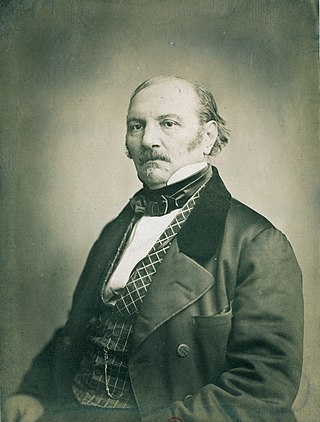
Spiritism is a spiritualist, religious, and philosophical doctrine established in France in the 1850s by the French teacher, educational writer, and translator Hippolyte Léon Denizard Rivail. He wrote books on "the nature, origin, and destiny of spirits, and their relation with the corporeal world" under Allan Kardec.

The Beatitudes are sayings of Jesus, and in particular eight blessings recounted by Jesus in the Sermon on the Mount in the Gospel of Matthew, and four in the Sermon on the Plain in the Gospel of Luke, followed by four woes which mirror the blessings. Each is a proverb-like proclamation, without narrative.

The Kadam school of Tibetan Buddhism was an 11th century Buddhist tradition founded by the great Bengali master Atiśa (982-1054) and his students like Dromtön (1005–1064), a Tibetan Buddhist lay master. The Kadampa stressed compassion, pure discipline and study.
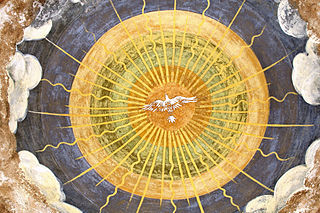
Pneumatology refers to a particular discipline within Christian theology that focuses on the study of the Holy Spirit. The term is derived from the Greek word Pneuma, which designates "breath" or "spirit" and metaphorically describes a non-material being or influence. The English term pneumatology comes from two Greek words: πνεῦμα and λόγος. Pneumatology includes study of the person of the Holy Spirit, and the works of the Holy Spirit. This latter category also includes Christian teachings on new birth, spiritual gifts (charismata), Spirit-baptism, sanctification, the inspiration of prophets, and the indwelling of the Holy Trinity. Different Christian denominations have different theological approaches on various pneumatological questions.

The charismatic movement in Christianity is a movement within established or mainstream Christian denominations to adopt beliefs and practices of Charismatic Christianity with an emphasis on baptism with the Holy Spirit, and the use of spiritual gifts (charismata). It has affected most denominations in the US, and has spread widely across the world.
Sanctification literally means "to set apart for special use or purpose", that is, to make holy or sacred. Therefore, sanctification refers to the state or process of being set apart, i.e. "made holy", as a vessel, full of the Holy Spirit of God. The concept of sanctification is widespread among religions, including Judaism and especially Christianity. The term can be used to refer to objects which are set apart for special purposes, but the most common use within Christian theology is in reference to the change brought about by God in a believer, begun at the point of salvation and continuing throughout the life of the believer. Many forms of Christianity believe that this process will only be completed in Heaven, but some believe that complete holiness is possible in this life.

Christian tradition is a collection of traditions consisting of practices or beliefs associated with Christianity. These ecclesiastical traditions have more or less authority based on the nature of the practices or beliefs and on the group in question. Many churches have traditional practices, such as particular patterns of worship or rites, that developed over time. Deviations from such patterns are sometimes considered unacceptable or heretical. There are certain Christian traditions that are practiced throughout the liturgical year, such as praying a daily devotional during Advent, erecting a nativity scene during Christmastide, chalking the door on Epiphany Day, fasting during Lent, waving palms on Palm Sunday, eating easter eggs during Eastertide, and decorating the church in red on Pentecost.
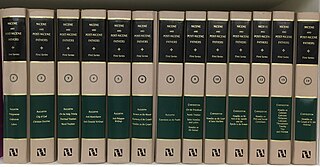
Sacred tradition is a theological term used in Christian theology. According to the theology of the Catholic, Eastern Orthodox, Oriental Orthodox and Assyrian churches, sacred tradition is the foundation of the doctrinal and spiritual authority of Christianity and of the Bible. Thus, the Bible must be interpreted within the context of sacred tradition and within the community of the denomination.
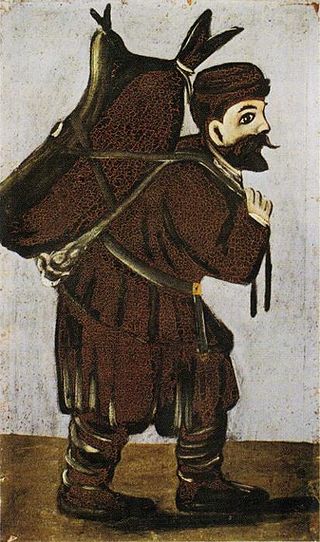
New Wine into Old Wineskins is a parable of Jesus. It is found at Matthew 9:14-17, Mark 2:18-22 and Luke 5:33-39.
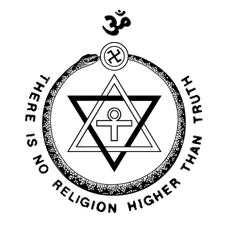
Neo-Theosophy is a term, originally derogatory, used by the followers of Helena Blavatsky to denominate the system of Theosophical ideas expounded by Annie Besant and Charles Webster Leadbeater following the death of Madame Blavatsky in 1891. This material differed in major respects from Blavatsky's original presentation, but it is accepted as genuinely Theosophical by many Theosophists around the world.

Noah Levine is an American Buddhist teacher and author, son of American Buddhist teacher and poet Stephen Levine. As a counselor known for his philosophical alignment with Buddhism and punk ideology, he identifies his Buddhist beliefs and practices with both the Theravada and Mahayana traditions. He has written several books on Buddhism and Buddhist practice including Refuge Recovery: A Buddhist Path to Recovering from Addiction.

God in Christianity is believed to be the eternal, supreme being who created and preserves all things. Christians believe in a monotheistic conception of God, which is both transcendent and immanent. Christian teachings on the transcendence, immanence, and involvement of God in the world and his love for humanity exclude the belief that God is of the same substance as the created universe but accept that God the Son assumed hypostatically united human nature, thus becoming man in a unique event known as "the Incarnation".

Christian theology is the theology of Christian belief and practice. Such study concentrates primarily upon the texts of the Old Testament and of the New Testament, as well as on Christian tradition. Christian theologians use biblical exegesis, rational analysis and argument. Theologians may undertake the study of Christian theology for a variety of reasons, such as in order to:

For the majority of Christian denominations, the Holy Spirit, or Holy Ghost, is believed to be the third person of the Trinity, a Triune God manifested as God the Father, God the Son, and God the Holy Spirit, each person itself being God. Nontrinitarian Christians, who reject the doctrine of the Trinity, differ significantly from mainstream Christianity in their beliefs about the Holy Spirit. In Christian theology, pneumatology is the study of the Holy Spirit. Due to Christianity's historical relationship with Judaism, theologians often identify the Holy Spirit with the concept of the Ruach Hakodesh in Jewish scripture, on the theory that Jesus was expanding upon these Jewish concepts. Similar names, and ideas, include the Ruach Elohim, Ruach YHWH, and the Ruach Hakodesh. In the New Testament it is identified with the Spirit of Christ, the Spirit of Truth, the Paraclete and the Holy Spirit.
The position of the Eastern Orthodox Church regarding the Filioque controversy is defined by their interpretation of the Bible, and the teachings of the Church Fathers, creeds and definitions of the seven Ecumenical Councils, as well as the decisions of several particular councils of the Eastern Orthodox Church.
Comfa is a folk religion in Guyana also known as Spiritualism or Faithism. The word "Comfa" is used by non-practitioners as a generic term for spirit possession in Guyana. However, the word "Comfa" is also a term to define the greater folk religion involving spirit possession originating in Guyana.